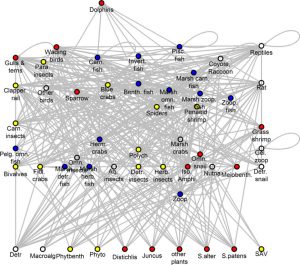Study Identifies Key Species that Influence Marsh Ecosystem Responses to Oiling
– DECEMBER 18, 2017
Scientists constructed a food web model using data from published studies and their field experiences to understand how specific Louisiana salt marsh organisms influenced ecosystem response to the Deepwater Horizon oil spill. The researchers found that carnivorous fishes were “critically resilient” and likely enhanced food web resilience. Gulls, terns, omnivorous snails, and wading birds were “critically sensitive” and potentially destabilized the food web. The framework for assessing how individual species influence food web responses to stressors is applicable to other marsh threats and to habitats beyond Louisiana marshes. The researchers published their findings in Frontiers in Ecology and the Environment: Key taxa in food web responses to stressors: the Deepwater Horizon oil spill.
The impact of oil spills to individual species can indirectly affect other areas of the food web, yet little research has investigated the effects of Deepwater Horizon oil on coastal food web structure and dynamics. “Not all plants and animals in the marsh are equally sensitive to oil,” explained study author Michael McCann. “When oil hit the marsh, it was not just how sensitive to oil you are, but also how connected you are to the rest of the food web that mattered.”
McCann and his team conducted a literature review of 124 studies that documented feeding interactions between marsh consumers and resources. Species considered most important were both highly connected and occupied a unique position in the food web. The team synthesized this data and constructed an empirically derived food web model containing 376 links among 52 species. Using this information, the team determined the importance of individual taxa to the food web based on their connectivity and uniqueness. Then, the team used 37 studies to score the oil sensitivity of species, with scores representing no, weak, or strong responses to oiling.
“Some species such as red drum (Sciaenops ocellatus) and Gulf killifish (Fundulus grandis) were very resistant to oil and important to the food web, thus making the marsh food web more resilient in the face of the oil spill,” explained McCann. “Other animals such as gulls and terns and the snail Littoraria irrorate likely made the marsh food web less stable during the oil spill because they are very important to the food web and highly sensitive to oil.”
Hermit crabs and large fish species feeding on marsh edge benthos, such as hardhead catfish and spot, also showed potential as critically resilient species. Grass shrimp and meiobenthos showed high oil sensitivity but low food web importance. Blue crabs were the most important food web node, but were only moderately sensitive to oil. It is currently unclear if moderate-sensitivity/high-importance species would be stabilizing or destabilizing after a spill. The researchers recommended that future studies focus on the indirect effects of oil mediated through blue crab life stages.
The findings suggest that organisms with high food web importance should be a conservation priority because of the potential for negative cascading effects. “There are still many species in the marsh that we don’t know how sensitive they are to oil,” said McCann. “These include jellyfish, marsh crabs (Armases cinereum), and reptiles such as snakes, alligators, and terrapins.” The authors suggested that future investigations prioritize these species and to consider non-trophic interactions when quantifying ecosystem importance and focus on the sublethal effects of oiling that might affect the food web.
Data are publicly available through the Gulf of Mexico Research Initiative Information & Data Cooperative (GRIIDC) at doi:10.7266/N7RN35V6.
The study authors are Michael J. McCann, Kenneth W. Able, Robert R. Christian, F. Joel Fodrie, Olaf P. Jensen, Jessica J. Johnson, Paola C. Lopez-Duarte, Charles W. Martin, Jill A. Olin, Michael J. Polito, Brian J. Roberts, and Shelby L. Ziegler.
************
This research was made possible in part by a grant from the Gulf of Mexico Research Initiative (GoMRI) to the Coastal Waters Consortium II (CWC II).
The Gulf of Mexico Research Initiative (GoMRI) is a 10-year independent research program established to study the effect, and the potential associated impact, of hydrocarbon releases on the environment and public health, as well as to develop improved spill mitigation, oil detection, characterization and remediation technologies. An independent and academic 20-member Research Board makes the funding and research direction decisions to ensure the intellectual quality, effectiveness and academic independence of the GoMRI research. All research data, findings and publications will be made publicly available. The program was established through a $500 million financial commitment from BP. For more information, visit https://gulfresearchinitiative.org/.
© Copyright 2010-2017 Gulf of Mexico Research Initiative (GoMRI) – All Rights Reserved. Redistribution is encouraged with acknowledgement to the Gulf of Mexico Research Initiative (GoMRI). Please credit images and/or videos as done in each article. Questions? Contact web-content editor Nilde “Maggie” Dannreuther, Northern Gulf Institute, Mississippi State University (maggied@ngi.msstate.edu).






